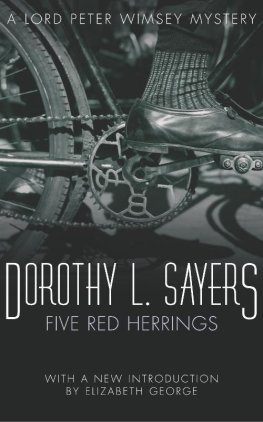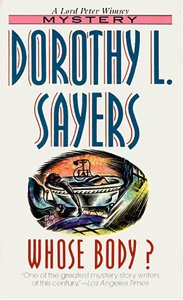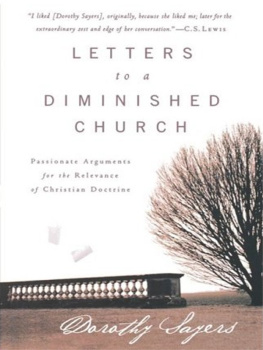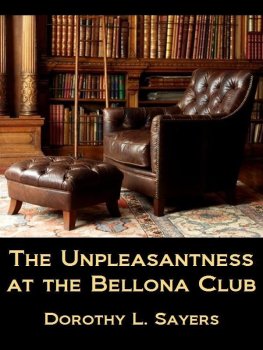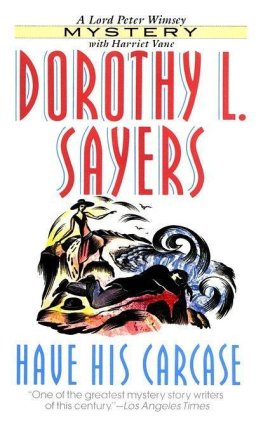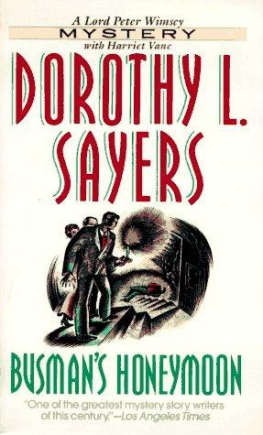
Dorothy L. Sayers
Clouds of Witness
The second book in the Peter Wimsey series, 1926
Communicated by Paul Austin Delagardie
WIMSEY, Peter Death Bredon, D.S.O.; born 1890, snd son of Mortimer Gerald Bredon Wimsey, 15th Duke of Denver, and of Honoria Lucasta, daughter of Francis Delagardie of Bellingham Manor, Hants.
Educated: Eton College and Balliol College, Oxford (ist class honours, Sch. of Mod. Hist. 1912); served with H.M. Forces 1914/18 (Major, Rifle Brigade).
Author of: "Notes on the Collecting of Incunabula," "The Murderer's Vade-Mecum," etc.
Recreations: Criminology; bibliophily; music; cricket.
Clubs: Marlborough; Egotist's.
Residences: [Garbled] Piccadilly, W.; Bredon Hall, Duke's Denver, Norfolk.
Arms: Sable, 3 mice courant, argent; crest, a domestic cat couched as to spring, proper; motto: As my Whimsy takes me.
This re-issue of Clouds of Witness (which has received some corrections and amendments from Miss Sayers) has for a Preface this short biography of Lord Peter Wimsey, brought up to date in 1935 and communicated by his uncle Paul Austin Delagardie.
I AM ASKED by Miss Sayers to fill up certain lacunae and correct a few trifling errors of fact in her account of my nephew Peter's career. I shall do so with pleasure. To appear publicly in print is every man's ambition, and by acting as a kind of running footman to my nephew's triumph I shall only be showing a modesty suitable to my advanced age.
The Wimsey family is an ancient one-too ancient, if you ask me. The only sensible thing Peter's father ever did was to ally his exhausted stock with the vigorous French-English strain of the Delagardies. Even so, my nephew Gerald (the present Duke of Denver) is nothing but a beef-witted English squire, and my niece Mary was flighty and foolish enough till she married a policeman and settled down. Peter, I am glad to say, takes after his mother and me. True, he is all nerves and nose-but that is better than being all brawn and no brains like his father and brothers, or a mere bundle of emotions, like Gerald's boy, Saint-George.
He has at least inherited the Delagardie brains, by way of safeguard to the unfortunate Wimsey temperament.
Peter was born in 1890. His mother was being very much worried at the time by her husband's behaviour (Denver was always tiresome, though the big scandal did not break out till the Jubilee year), and her anxieties may have affected the boy. He was a colourless shrimp of a child, very restless and mischievous, and always much too sharp for his age. He had nothing of Gerald's robust physical beauty, but he developed what I can best call a kind of bodily cleverness, more skill than strength. He had a quick eye for a ball and beautiful hands for a horse. He had the devil's own pluck, too: the intelligent sort of pluck that sees the risk before it takes it. He suffered badly from nightmares as a child. To his father's consternation he grew up with a passion for books and music.
His early school-days were not happy. He was a fastidious child, and I suppose it was natural that his school-fellows should call him "Flimsy" and treat him as a kind of comic turn. And he might, in sheer self-protection, have accepted the position and degenerated into a mere licensed buffoon, if some games-master at Eton had not discovered that he was a brilliant natural cricketer. After that, of course, all his eccentricities were accepted as wit, and Gerald underwent the salutary shock of seeing his despised younger brother become a bigger personality than himself. By the time he reached the Sixth Form, Peter had contrived to become the fashion-athlete, scholar, arbiter elegantiarum-nec pluribus impar. Cricket had a great deal to do with it-plenty of Eton men will remember the "Great Flim" and his performance against Harrow-but I take credit to myself for introducing him to a good tailor, showing him the way about Town, and teaching him to distinguish good wine from bad. Denver bothered little about him-he had too many entanglements of his own and in addition was taken up with Gerald, who by this time was making a prize fool of himself at Oxford. As a matter of fact Peter never got on with his father, he was a ruthless young critic of the paternal misdemeanours, and his sympathy for his mother had a destructive effect upon his sense of humour.
Denver, needless to say, was the last person to tolerate his own failings in his offspring. It cost him a good deal of money to extricate Gerald from the Oxford affair, and he was willing enough to turn his other son over to me. Indeed, at the age of seventeen, Peter came to me of his own accord.
He was old for his age and exceedingly reasonable, and I treated him as a man of the world. I established him in trustworthy hands in Paris, instructing him to keep his affairs upon a sound business footing and to see that they terminated with goodwill on both sides and generosity on his. He fully justified my confidence. I believe that no woman has ever found cause to complain of Peter's treatment; and two at least of them have since married royalty (rather obscure royalties, I admit, but royalty of a sort).
Here again, I insist upon my due share of the credit; however good the material one has to work upon it is ridiculous to leave any young man's social education to chance.
The Peter of this period was really charming, very frank, modest and well-mannered, with a pretty, lively wit. In 1909 he went up with a scholarship to read History at Balliol, and here, I must confess, he became rather intolerable.
The world was at his feet, and he began to give himself airs. He acquired affectations, an exaggerated Oxford manner and a monocle, and aired his opinions a good deal, both in and out of the Union, though I will do him the justice to say that he never attempted to patronise his mother or me. He was in his second year when Denver broke his neck out hunting and Gerald succeeded to the title. Gerald showed more sense of responsibility than I had expected in dealing with the estate; his worst mistake was to marry his cousin Helen, a scrawny, over-bred prude, all county from head to heel. She and Peter loathed each other cordially; but he could always take refuge with his mother at the Dower House.
And then, in his last year at Oxford, Peter fell in love with a child of seventeen and instantly forgot everything he had ever been taught. He treated that girl as if she was made of gossamer, and me as a hardened old monster of depravity who had made him unfit to touch her delicate purity. I won't deny that they made an exquisite pair-all white and gold-a prince and princess of moonlight, people said.
Moonshine would have been nearer the mark. What Peter was to do in twenty years' time with a wife who had neither brains nor character nobody but his mother and myself ever troubled to ask, and he, of course, was completely besotted. Happily, Barbara's parents decided that she was too young to marry; so Peter went in for his final Schools in the temper of a Sir Eglamore achieving his first dragon; laid his First-Class Honours at his lady's feet like the dragon's head, and settled down to a period of virtuous probation.
Then came the War. Of course the young idiot was mad to get married before he went. But his own honourable scruples made him mere wax in other people's hands. It was pointed out to him that if he came back mutilated it would be very unfair to the girl. He hadn't thought of that; and rushed off in a frenzy of self-abnegation to release her from the engagement. I had no hand in that; I was glad enough of the result, but I couldn't stomach the means.
Next page

